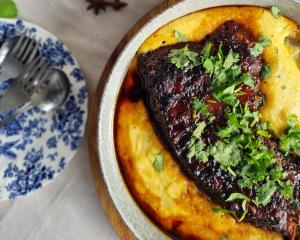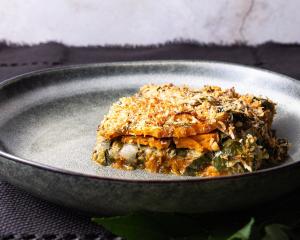
Otago's mountains have been Freddy Nordt’s playground for years, but this time when he comes to Queenstown it will on serious business - advancing his career in the kitchen.
That love of the mountains is responsible for Freddy Nordt discovering his niche.
While Nordt has a special place in his heart for Wanaka and Queenstown, it was while skiing in France that he found his true love.
‘‘I’ve always loved the Queenstown region and being in the mountains.’’
To pay the bills he got work in a kitchen, and the rest, as they say, is history.
‘‘I fell in love with the kitchen environment. It was fast-paced and exciting.’’
While he had always enjoyed cooking and he grew up in a family - his parents are German immigrants - that always cooked, it was not until he was ‘‘hands on’’ fully immersed in a kitchen that it all clicked.
‘‘I thought OK, lets go.’’
Nordt (25) is from Christchurch and studied commerce and tourism at the University of Otago but he knew a desk job was not for him when he returned to New Zealand when Covid struck.
Instead he headed for the mountains, doing a season as a chef in a Cardrona kitchen before quickly realising he wanted to pursue cheffing as a career. So he applied for an apprenticeship at Black Estate in Waipara, North Canterbury, which has its own restaurant specialising in using organic, biodynamic and spray-free produce grown, and fished locally.
‘‘I really liked their food philosophy. It was a great time. The main thing I learnt at Black Estate was that the product comes first, use the best quality local, sustainable ingredients and cook them simply. Let the produce speak for itself.’’

Working with the seasons and what is available ‘‘feels like a nice full circle’’ rather than trying to use tomatoes in winter. Not only does it save money but produce tastes better at its peak. It’s a win, win for everyone.’’
Having absorbed as much as he could there, Nordt then set his sights on a job at Blanket Bay Lodge near Glenorchy, working under chef Dan Reynolds for a summer.
‘‘It’s a well-respected lodge. I thought it be such a great environment to learn a lot of new skills quickly. I did a trial with Dan and it seemed a great supportive, challenging kitchen environment.’’
He attended a recent HospoHui keen to learn more, and was due to compete in the associated Feast event where young chefs were teamed up with established chefs until it was cancelled due to the pressures on hospitality.
Instead, chef Kyle Street of Culprit restaurant in Auckland offered Nordt a chance to work in his kitchen for the weekend. He got to take part in service for a night and serve his Feast dish - venison tartare, mushroom custard, fermented shiitake mushrooms and potato shards.
‘‘It’s a combination of what I’ve learnt from the two chefs I’ve worked with. I’m quite proud of it.’’
Nordt loved the adrenaline and flow of the work at Culprit.
‘‘I got to learn new things and taste delicious food. For me personally it was exciting.’’
He admits his culinary adventures do not extend to his own personal cooking.
‘‘I eat a lot of eggs on toast. You can’t go wrong with a free-range egg. They’re quick and don’t disappoint.’’
As to his future, he is undecided but it will be in a kitchen. ‘‘I might go overseas for a year just to see what work is like over there and then come back to New Zealand and sink my teeth in to the New Zealand hospo scene.’’

ANNA POLYVIOU admits she is a strict task master but it is nothing that she does not expect from herself, she tells New Zealand’s hospitality industry.
Indeed, turn up to work for Australian’s ‘‘punk princess of pastry’’ looking untidy and you are just as likely to be sent home.
‘‘You need discipline in the kitchen. Our shirts are always pressed. If you walk into the kitchen looking like s---, you’ll produce s---.
‘‘You need to have self-respect in yourself and in your customers.’’
Known for her pink mohawk and appearances on television shows MasterChef Australia and Snack Masters, Polyviou is a big believer in leading by example. ‘‘I still pinch myself at how lucky am I.’’
Polyviou has a simple philosophy. ‘‘Everyone comes in 15 minutes early, we have lunch break or dinner break together; it’s important as we are family with common goals, and we finish all together.’’
It has not been an easy road for Sydney-based Polyviou, who was a self-described ‘‘troubled kid’’ at school. ‘‘I come from a Greek Cypriot family and we’re always around food so I got into cooking. My family is over the top so I think that is where the personality comes from.’’
Polyviou found her home when she applied for a job at Sofitel in Melbourne and then secured an apprenticeship working with top chefs such as George Calombaris.
She was named Les Toque Blanche’s ‘‘best apprentice in Victoria’’ and won a scholarship to work anywhere in the world. She chose the Michelin-starred Claridge’s Hotel in London.
She then went on to work in Paris working with a top chocolatier.
‘‘That competition changed my life.’’
She went on to win a raft of titles including Australia’s hotel chef of the year and pastry chef of the year and best dessert in the United Kingdom.
‘‘I’m not the best pastry chef ,I’m not the best chef but I work hard,‘‘ she says. ‘‘And I’ll always do that. It’s not the best that wins gold, it’s the best organised.’’
Another moment that changed her life was her first appearance on MasterChef Australia. It was from there that her trademark mohawk haircut evolved.
‘‘I always think about what I‘m going to wear, my watch has to match, my trainers have to match. [Appearance] is really important.’’
She appeared on the show with a white and black mohawk - a haircut that evolved from her girlfriend accidentally shaving off one side of her hair.
‘‘I cried when I saw it.’’
It became pink when she was asked to dye it for the Family Food Fight television show. So she rang her mum, who said she had to do what she had to do.
‘‘She was encouraging it. I was like ‘Oh man, pink how embarrassing’. But what we found was it softened the personality, the kids loved it. Now I’ve left it. I’m very true to who I am.’’
So while her brand almost by mistake, it now appears on her merchandise and even her shoes.
‘‘It’s all about the experience - that’s what the brand’s about as well.’’
From then she was stopped in streets and at the airport by people wanting photographs.
‘‘I was very overwhelmed. I didn’t know how to deal with it.’’
These days she copes by hibernating for a couple weeks after a big public appearance to let the mania settle.
She looks after her own social media most of the time, doing her best to reply to those who contact her.
‘‘I want to engage with them. They support by brand. Always stay grounded and humble.’’
That also means what you see, is what you get, there is no public Anna Polyviou and a private one - ‘‘it’s too difficult to be that way.’’
Polyviou has also authored a couple of cookbooks - her first Sweet Street in 2018 sold out in weeks - and is creative director of her own business.
Her profile has led to many requests to partner with different brands.
This has included making the world’s largest dog cake - 2.5m tall - for Scooby Doo’s 50th anniversary, to working with G-Shock, Barbie and the Shangri-la Hotel in Sydney, where she put hotel patisserie on the map during her seven years as its creative director of pastry and where she started the Sweet Street festival, a showcase of Sydney’s top dessert chefs.
‘‘If I don’t feel it will fit my brand I won’t work with them. Money comes later. Being honest, true and inspiring is a priceless experience. It’s what I’ve always done.’’
But it has not been plain sailing, especially with the pandemic. Polyviou said she struggled as she likes to be in control.
‘‘I felt unimportant in a way, useless, so that is where the cookie dough started off.’’
In a collaboration Polyviou developed a pre-made cookie dough product. Then she got involved with the investor on another project, which turned out to be not such a good business deal.
The investor pulled out of the cookie dough business, leaving bills unpaid.
‘‘I was losing sleep but it was my f--k-up, it isn’t someone else’s problem.’’
So she took equity out of her house and paid the bills herself.
‘‘We have to look after our suppliers and our staff. It wasn’t about my brand. I forgot about my brand.’’
It taught her an important lesson so she has gone back studying to learn about business practices so she does not not fall into the same trap again.
‘‘Yes my brand is strong but you have to do the right thing by people. There is stuff I do not know. With the cookie dough, I believe quite strongly if I do the right thing, pay my suppliers, the money will come.’’
She is keen to further promote the cookie dough side of the business, doing pop-ups and interactive experiences in the future.
There is also a TV show with her mother in the works.













